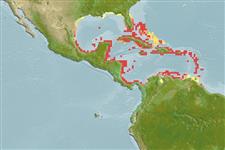Common names from other countries
>
Ovalentaria/misc (Various families in series Ovalentaria) >
Pomacentridae (Damselfishes) > Microspathodontinae
Etymology: Stegastes: Greek, stegastos, -e, -on = covered (Ref. 45335).
More on author: Troschel.
Environment: milieu / climate zone / depth range / distribution range
Ecologia
marinhas associadas(os) a recifes; não migratória; intervalo de profundidade 0 - 3 m (Ref. 7247). Tropical; 32°N - 8°N, 98°W - 59°W
Western Central Atlantic: Florida, Gulf of Mexico, Caribbean Sea and along the coast of central America to Panama and Venezuela. Also known from the Bahamas and the Antilles.
Tamanho / Peso / Idade
Maturity: Lm ? range ? - ? cm
Max length : 15.0 cm TL macho/indeterminado; (Ref. 26340)
Espinhos dorsais (total): 12; Raios dorsais moles (total): 14-17; Espinhos anais 2; Raios anais moles: 13 - 15. Juveniles are reddish orange above, with small bright blue spots on forehead and dark spots at upper pectoral fin base, dorsal fin, and caudal peduncle; colors disappear as fish grows larger (Ref. 26938). Adults dark gray to blackish with vertical black lines on body; a black spot, sometimes diffuse, at upper base of pectoral fins which are pale; other fins dark (Ref. 13442).
Adults inhabit rocky shores exposed to wave action. Often in tide pools. Feed primarily on algae and detritus. Territorial and pugnacious. Generally common (Ref. 9710). Oviparous, distinct pairing during breeding (Ref. 205). Eggs are demersal and adhere to the substrate (Ref. 205). Males guard and aerate the eggs (Ref. 205). Taken incidentally in traps and small-meshed beach nets (Ref. 5217).
Life cycle and mating behavior
Maturidade | Reprodução | Desova | Ovos | Fecundidade | Larvas
Oviparous, distinct pairing during breeding (Ref. 205). Eggs are demersal and adhere to the substrate (Ref. 205). Males guard and aerate the eggs (Ref. 205).
Allen, G.R., 1991. Damselfishes of the world. Mergus Publishers, Melle, Germany. 271 p. (Ref. 7247)
Categoria na Lista Vermelha da IUCN (Ref. 130435)
CITES (Ref. 128078)
Not Evaluated
Ameaça para o homem
Harmless
Utilização humana
Aquário: Espécies comerciais
Mais informação
ReferênciasAquaculturaPerfil para aquaculturaEstirpesGenéticaElectrophoresesHereditariedadeDoençasProcessamentoMass conversion
Ferramentas
Relatórios especiais
Descarregue XML
Fontes da internet
Estimates based on models
Preferred temperature (Ref.
115969): 26.2 - 28.3, mean 27.5 (based on 449 cells).
Phylogenetic diversity index (Ref.
82804): PD
50 = 0.5000 [Uniqueness, from 0.5 = low to 2.0 = high].
Bayesian length-weight: a=0.01950 (0.00893 - 0.04257), b=2.99 (2.81 - 3.17), in cm Total Length, based on LWR estimates for this Genus-body shape (Ref.
93245).
Nível Trófico (Ref.
69278): 2.5 ±0.1 se; based on diet studies.
Resiliência (Ref.
120179): Elevada, tempo mínimo de duplicação da população menor que 15 meses (Preliminary K or Fecundity.).
Fishing Vulnerability (Ref.
59153): Low vulnerability (10 of 100).
